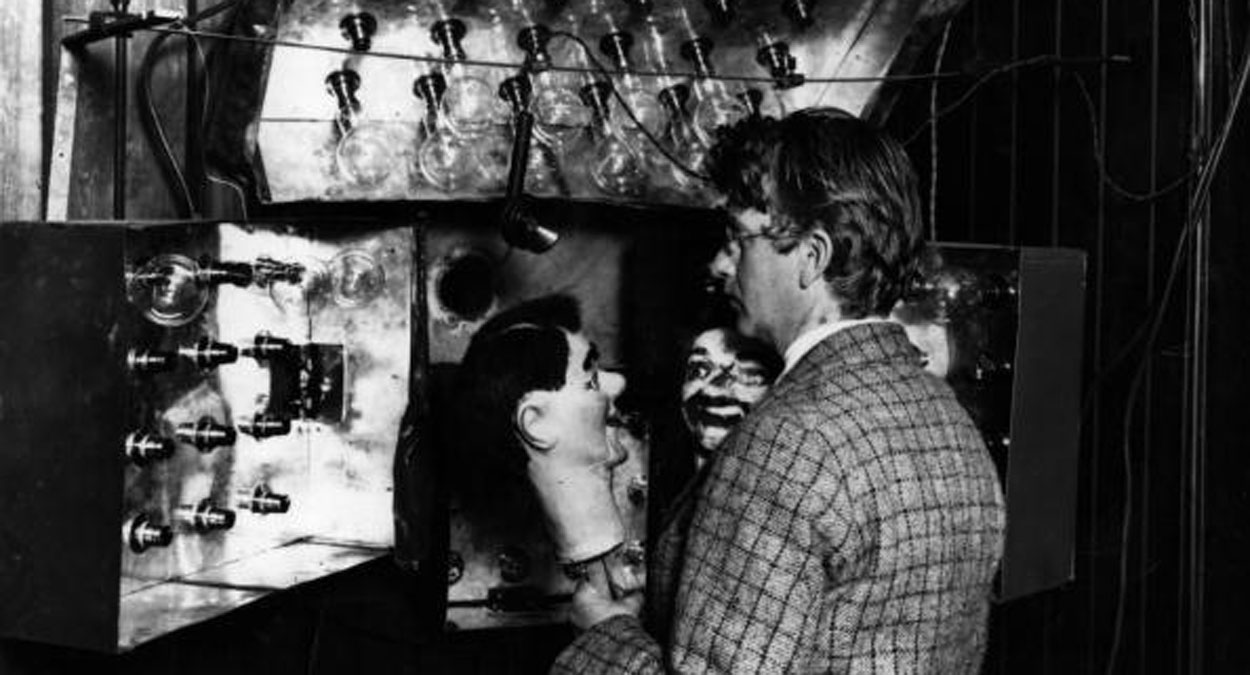Google joins in celebrations for TV's 90th birthday
John Logie Baird's invention was impractical and became obsolete quickly, but it remains TV genesis

A free daily email with the biggest news stories of the day – and the best features from TheWeek.com
You are now subscribed
Your newsletter sign-up was successful
Ninety years ago today, in a building in Soho, the first live television demonstration took place in front of a room of members of the Royal Institution and a journalist from The Times.
A face – that of a man called Oliver Hutchinson – appeared on in a small 3.5ins by two inch picture. He was the business partner of John Logie Baird, the Scot often credited with having invented the television – or "Televisor", as it was touted back then.
The historic moment is celebrated in today's Google Doodle.
The Week
Escape your echo chamber. Get the facts behind the news, plus analysis from multiple perspectives.

Sign up for The Week's Free Newsletters
From our morning news briefing to a weekly Good News Newsletter, get the best of The Week delivered directly to your inbox.
From our morning news briefing to a weekly Good News Newsletter, get the best of The Week delivered directly to your inbox.
TV's baby steps didn't exactly enthral those present. According to the Daily Telegraph, The Times journalist later wrote: "It has yet to be seen to what extent further developments will carry Mr Baird's system towards practical use," and complained that the pictures were often blurred and faint.
A year earlier, Baird had been kicked out of the Daily Express offices and called a "lunatic" by the news editor, who was frightened by claims of a machine for "seeing by wireless."
The Scot's first successful test of his Televisor was in 1924, when he transmitted a flickering image onto a wall ten feet away. Two years later, it was a clearer image of Hutchinson in a different room which is now regarded to be the first television demonstration as earlier showcases projected nothing more than faint silhouettes.
Baird's television was "a crude version of the modern telly resembling a radio", says The Independent.
A free daily email with the biggest news stories of the day – and the best features from TheWeek.com
In involved two large revolving disks equipped with lenses that span and broke down light reflected from any object in front of it. These reflections were then turned into "flashes of electric code", which were transmitted to a receiver to reconstruct the image.
Despite Baird's breakthrough, as soon as a newer, clearer way of transmitting pictures was developed, he quickly lost out - "doomed to be the man who sows the seed but does not reap the harvest," said journalist and critic Dame Rebecca West.
In 1936, in a battle to be the official broadcasting system used by the BBC, his system went up against the Marconi-EMI television.
The heavily mechanical aspect of the Baird system, combined with its much more limited range and capacity and the intense light beamed at the presenter, made for an impractical and physically uncomfortable operation.
Within three months, the superior Marconi-EMI was selected and the BBC's Baird studios at the Alexandra Palace were shut down.
His system did win a consolation prize though - it beat the Marconi system in a coin toss to broadcast the BBC's first official "high-definition" programme, reports the broadcaster itself.
-
 Why is the Trump administration talking about ‘Western civilization’?
Why is the Trump administration talking about ‘Western civilization’?Talking Points Rubio says Europe, US bonded by religion and ancestry
-
 Quentin Deranque: a student’s death energizes the French far right
Quentin Deranque: a student’s death energizes the French far rightIN THE SPOTLIGHT Reactions to the violent killing of an ultraconservative activist offer a glimpse at the culture wars roiling France ahead of next year’s elections
-
 Secured vs. unsecured loans: how do they differ and which is better?
Secured vs. unsecured loans: how do they differ and which is better?the explainer They are distinguished by the level of risk and the inclusion of collateral
-
 Will AI kill the smartphone?
Will AI kill the smartphone?In The Spotlight OpenAI and Meta want to unseat the ‘Lennon and McCartney’ of the gadget era
-
 Has Google burst the Nvidia bubble?
Has Google burst the Nvidia bubble?Today’s Big Question The world’s most valuable company faces a challenge from Google, as companies eye up ‘more specialised’ and ‘less power-hungry’ alternatives
-
 How the online world relies on AWS cloud servers
How the online world relies on AWS cloud serversThe Explainer Chaos caused by Monday’s online outage shows that ‘when AWS sneezes, half the internet catches the flu’
-
 Is the UK government getting too close to Big Tech?
Is the UK government getting too close to Big Tech?Today’s Big Question US-UK tech pact, supported by Nvidia and OpenAI, is part of Silicon Valley drive to ‘lock in’ American AI with US allies
-
 Google: A monopoly past its prime?
Google: A monopoly past its prime?Feature Google’s antitrust case ends with a slap on the wrist as courts struggle to keep up with the tech industry’s rapid changes
-
 South Korea's divide over allowing Google Maps
South Korea's divide over allowing Google MapsTalking Points The country is one of few modern democracies where the app doesn't work
-
 Google avoids the worst in antitrust ruling
Google avoids the worst in antitrust rulingSpeed Read A federal judge rejected the government's request to break up Google
-
 Is AI killing the internet?
Is AI killing the internet?Talking Point AI-powered browsers and search engines are threatening the death of the open web